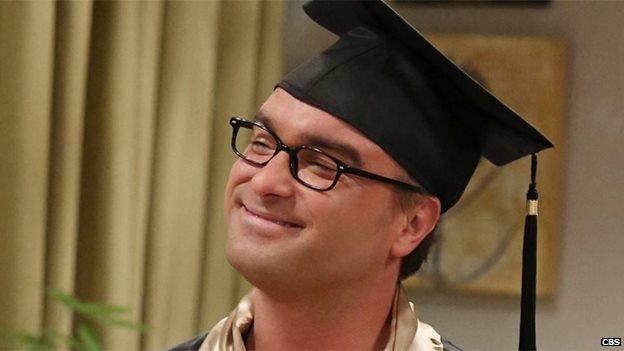The Big Bang Theory creates $4m scholarship for future scientists
- Published

The cast, including former Roseanne star Johnny Galecki, are paid a reported $1m per episode
The cast and creators of TV comedy The Big Bang Theory have created a $4m (£2.6m) scholarship fund to support low-income science students.
Although the sitcom is partly set at California's Caltech, the fund will sponsor studies in science, technology, engineering and maths at rival UCLA.
Series star Mayim Bialik earned a PhD in neuroscience from the university in 2007.
The first 20 scholars will be announced on the Big Bang Theory set this autumn.
"We have all been given a gift with The Big Bang Theory, a show that's not only based in the scientific community, but also enthusiastically supported by that same community - this is our opportunity to give back," said the show's creator, Chuck Lorre.
"In that spirit, our Big Bang family has made a meaningful contribution, and together, we'll share in the support of these future scholars, scientists and leaders."

Mayim Bialik (left), the former child star of Blossom, holds a doctorate from UCLA
The programme, which documents the achievements and obsessions of four science nerds and the (mostly) successful women who tolerate them, has just finished its eighth season.
Prof Stephen Hawking, Nobel Prize laureate George Smoot, astronaut Buzz Aldrin, Apple co-founder Steve Wozniak and theoretical physicist Brian Greene have all made cameos on the show, along with the cast of Star Trek and other sci-fi franchises.
It was nearly derailed by a pay dispute last summer, which saw principal cast members Jim Parsons, Johnny Galecki and Kaley Cuoco-Sweeting negotiate a reported fee of $1m (£650,000) per episode.
UCLA said the scholarship endowment was the university's first to be created by the cast and crew of a television series.
A total of $4m has been raised to date for the fund, according to scholarship partner Warner Bros TV.
That includes an initial donation from the Chuck Lorre Family Foundation combined with gifts from people associated with the show, including its stars, executive producers and crew, and TV companies CBS and WBTV.
After the initial intake of 20 students for the 2015-16 academic year, the scholarship will support five further students every year in perpetuity.
- Published5 August 2014

- Published4 August 2014

- Published12 March 2014
